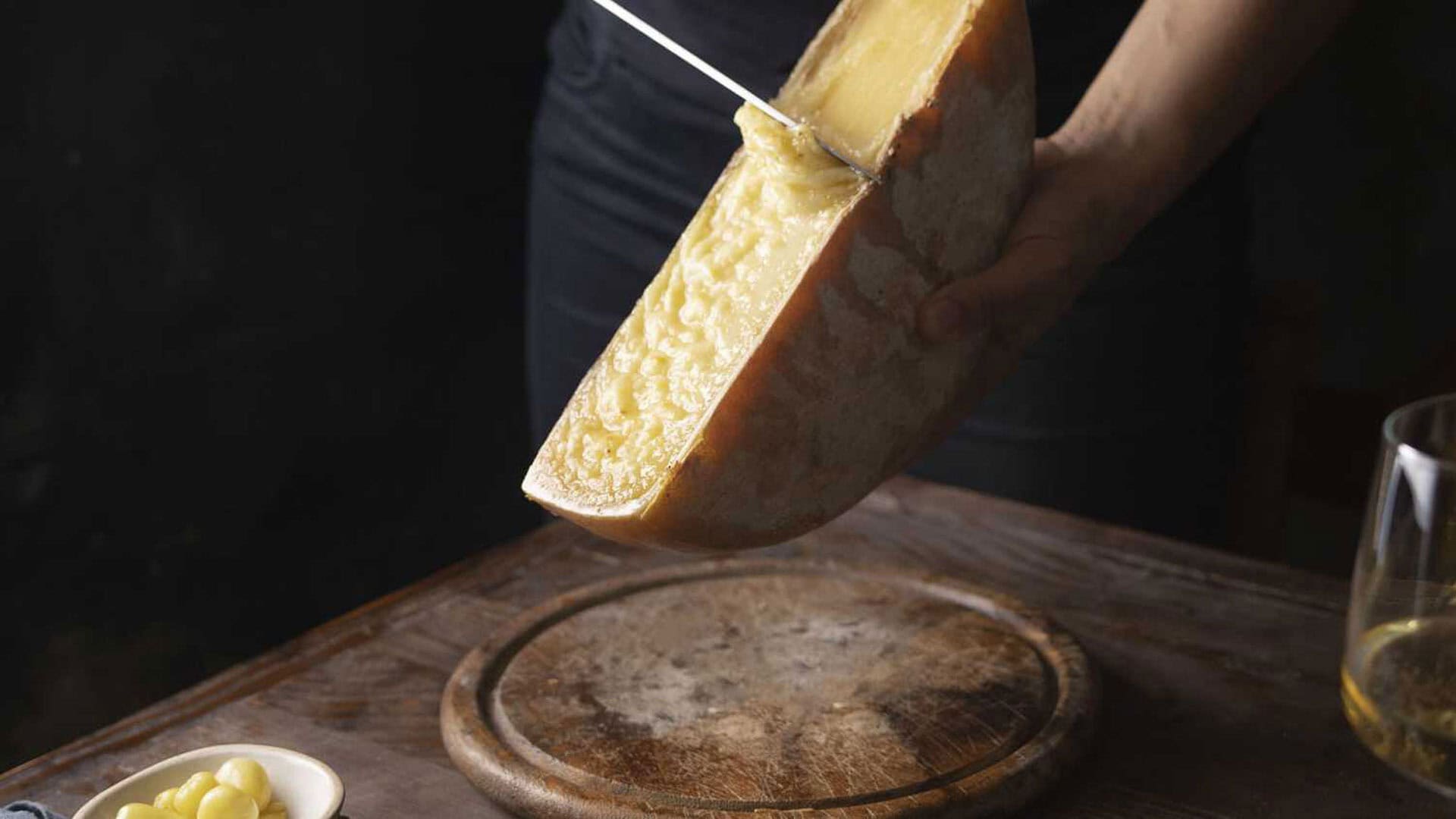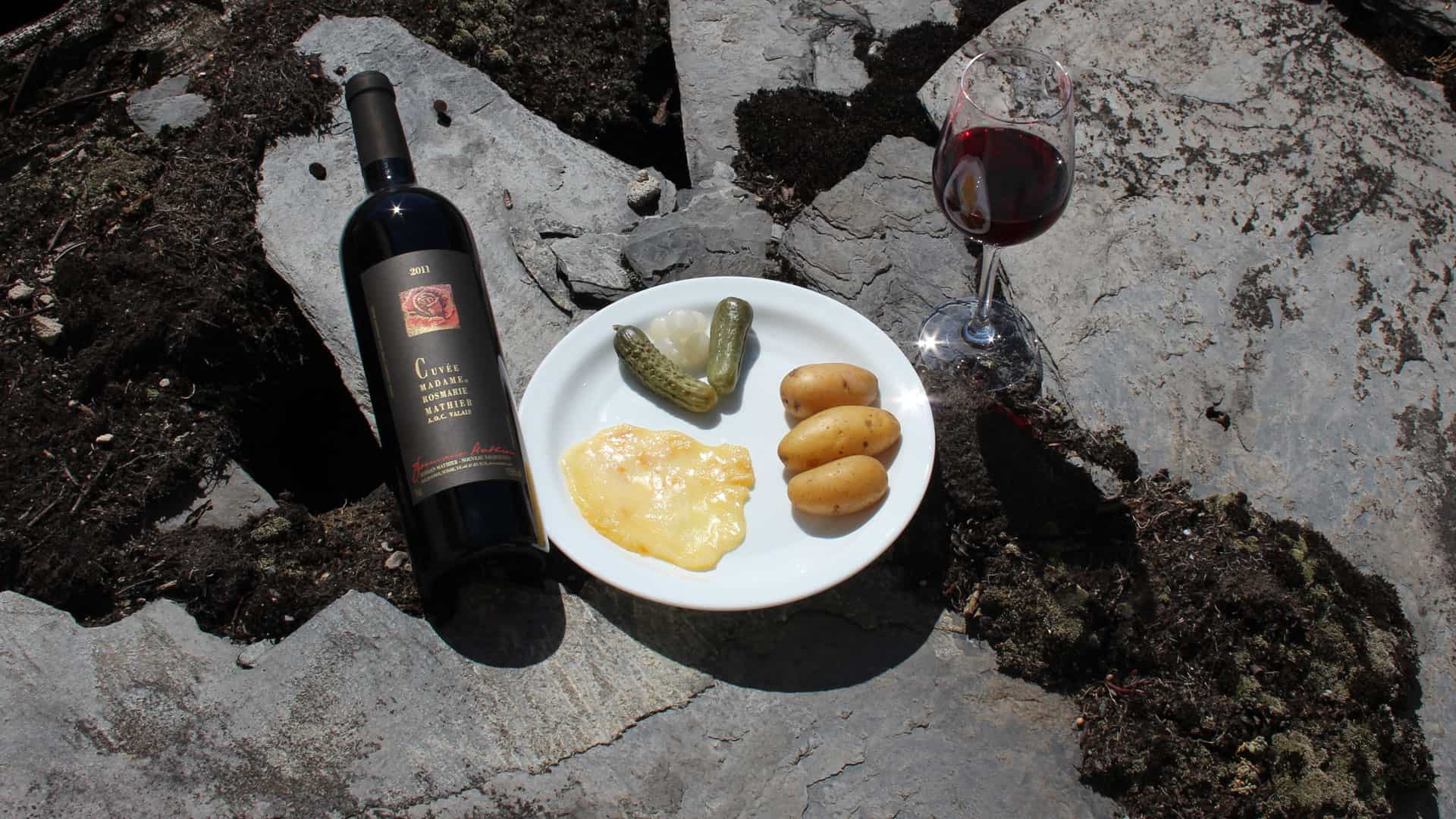A Valais duo with cult status: wine & raclette
Who invented it? Exactly, the people of Valais. We’re talking about raclette, of course. It is said that a shepherd once left his half-loaf of cheese too close to the fire after a day’s hard work above the Varner Alb. When he returned to the fireplace, he found the delicious treat in the form of the melted cheese, which he naturally wanted to save by quickly spreading it on a piece of bread and then devouring it with relish. The birth of the Valais raclette.

To the annoyance of some wine lovers, however, it is not known whether the shepherd enjoyed a raclette for the first time and, if so, which wine. This is probably one of the reasons why opinions still run high to this day as to which wine best enhances a Valais raclette. The fact that the Valaisans prefer to enjoy their raclette in summer and outdoors does not change this, even though raclette has developed into a year-round dish. After all, it is well known that white wine, red wine and sparkling wine can be enjoyed equally well in summer and winter.
White wine – the ideal choice
If you believe the locals, however, white wine is beyond any doubt as an accompaniment. This is probably largely due to the fact that white wines have the edge in terms of freshness. By freshness, we mean both the freshness of the wine on the nose and palate and the freshness of the temperature. On the other hand, the acidity factor should also be mentioned. This time, however, not as a decisive selection criterion for the wine, but in the cheese. Raclette cheese not only has a fairly high fat content, but also a good portion of acidity. If an acidic wine comes into play, the culinary delights quickly come to an end. Dry white wines such as a Valais Fendant (Chasselas), with its fresh and fruity aromas and low acidity, are therefore the ideal accompaniment to Valais raclette. You also can’t go wrong with a Johannisberg, a Humagne blanc or a Petite Arvine with a Valais raclette. However, you should avoid wines with more residual sweetness, as these white wines run the risk of masking the creaminess of the raclette cheese. So if you don’t want to go wrong, opt for the Fendant (Chasselas) from the range of the three best Swiss wineries of 2018, 2011 and 2007. You can do this with a clear conscience, because in addition to its own taste, which is of course paramount, the Fendant du Ravin AOC Valais also has the title of the best Fendant (Chasselas) in the universe and the Swiss championship title in its category. But the three other Fendant (Chasselas) white wines from Mathier, the

Red wine with raclette?
And what about red wine, you may ask? Red wine and raclette. Do the two have more in common than just the first letter? Can they really go down well on the palate? As with fondue, there are proponents and those for whom raclette with red wine is a taboo. We are of the opinion that you should give it a try without further ado. Red wine with melted Valais cheese – whether fondue or raclette – adds a modern touch to dishes that can be quite enriching. As with all other dishes, the wine should of course not mask the taste of the food, but at best accompany and enhance it. So when choosing a red wine, make sure that you opt for a light grape variety. And red wines that have been matured in barriques and have an overly intense tannin structure definitely have no place on the dinner table that evening. Instead, opt for an elegant Pinot Noir or a fine Gamay. Both red wines usually present themselves in a beautiful balance and offer soft,

And before you start planning your next raclette meal, full of energy and anticipation, think about the wine first when preparing. It can only enhance your meal perfectly if it is served cool and at the right temperature. So store your white wine at 8° degrees so that it promises maximum drinking pleasure in the glass at 10°-12°. And for red wine, a storage temperature of 10°-12° is ideal so that it can be enjoyed at 12°-14°. Last but not least: Always keep the wine bottle and your wine glass well away from the caquelon or the stove – the wine will heat up faster than you think and you’ll lose the pleasure of drinking it.

